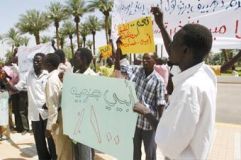Sudan’s Misariyah blame Abyei report for instability in the region
May 29, 2006 (KHARTOUM) — In a petition to the Sudanese presidency Misariyah Arab tribes in the disputed region of Abyei rejected the conclusions of Abyei Boundary Commission (ABC) and blamed it for the administrative deterioration and security instability in the area.
 The central oil-rich territory of Abyei continues to be one of the main stumbling blocks in the north-south deal because of a dispute between the Arab Misariyah and African Dinka Ngok tribes over ownership of the region.
The central oil-rich territory of Abyei continues to be one of the main stumbling blocks in the north-south deal because of a dispute between the Arab Misariyah and African Dinka Ngok tribes over ownership of the region.
In the first petition of its kind since an understanding and reactions were established towards the decision by the ABC, the Misariyah citizens of Abyei yesterday put forward a petition to the presidency.
It further recommended convening a special popular conference on the problem of Abyei to bring together both sides of the dispute and their neighbours and with all the people of Sudan to be represented. It further categorically rejected the ABC’s decision and blamed it for the administrative deterioration and security instability in the area. The petition was signed by 74 leaders of the Misariyah tribe in Abyei.
The petition which was delivered by Mahdi Babu Nimir, Hiraykah Izzeldin Humaidah, Mohamed Khatir Jumah, Adam Mohamed Salim and Suleiman al-Dibalu included the views of the Misariyah Arab tribe’s leadership regarding the ABC’s decision.
The tribe said in the petition that the ABC experts had based their decision on information from youths in the Sudan People’s Liberation Movement (SPLM) who did not have the expertise or historical knowledge of the land’s boundaries or the relationship between tribes.
According to the petition, the experts should have relied on leaders of neighbouring tribes who had knowledge of the boundaries and the relationships between the tribes for their information.
These leaders included the Nazir (tribal leader) Bashir Raihan who had lived with Nazir al-Rawb Biong south of the river and Nazir Latjok and Nazir Abdelbagi Akol of Abyei and Bahr-al-Ghazal.
The petition further said the experts had failed when they admitted they did not know the area’s 1905 boundaries. They said this was intentional because they had then based their findings on the 1956 boundaries. They said this in itself was a breach of the Abyei protocol and agreement and meant the protocol and constitution needed to be amended from 1905 to 1956.
The petition warned that the commission’s report inflamed disputes between the citizens of the area. In order to contain the disputes the petition said it was necessary to set up a new commission whose final decision would be taken by the people of Sudan.
The International Crisis Group think-tank said in a recent report that “the NCP’s actions regarding Abyei are a blatant violation of the CPA, creating perhaps the most volatile element of the entire agreement right now.”
About 50 Dinkas staged a demonstration outside the opening ceremony of the NCP-SPLM meeting shouting their support for the peace deal and calling for a swift resolution of the Abyei issue.
(ST)
